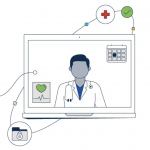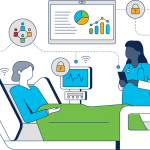The saying ‘Tell me how you will measure me and I will tell you how I will behave’ could have been the perfect tag line for the US Health Care Reforms. When we look at how Health Care Information technology is getting used to enable reforms, we see that most of the technologies existed prior to the reforms, but there wasn’t a compelling reason to adopt it. Once the measurement criteria, the carrots and the sticks were defined, the behaviors changed, and to achieve the metrics, the technology adoption picked up. As an example, according to CDC’s report, the adoption of office based physicians with EHR systems has increased to 78.4% in 2013 from 17.3% in 2003.

Maybe a coincidence, but the Health Care reforms and Health Care Internet of Everything (IoE) are very much intertwined. The Health Care reforms focus on the ‘why’ and ‘what’ changes are needed to enable outcomes and define how performance is measured. The Health Care Internet of Everything focuses on how technology can be leveraged to enable the goals of Health Care Reforms. By connecting the unconnected, IoE brings more information from multiple sources (things and people) to create an enhanced evidence based model to enable better outcomes.
From an IT perspective, Health Care Reforms requires breaking boundaries, opening up the access, enabling choices, improving data collection from multiple critical sources, and enabling information sharing. It is definitely a challenge to achieve these needs using the traditional approaches in Health Care. Hence Health Care approaches have evolved to leverage Health care IT as a change agent, thereby resulting in many new Health Care IT transitions.
Let us explore six key Health Care IT transitions that have significant security implications.


At a high level, the transitions focus on the relationships of things, data and people: who has access, where do they have access from, when can they access, how can they access, what are the source of the data, what is the destination of the data, how does the data come together, what is the consumption model and more.
These transitions bring significant benefits such as improved evidence, improved outcomes; improved convenience and choices to patients and providers, lower Health Care cost, better efficiencies, better empowerment and involvement of patients to improve quality of life.
Breaking the traditional boundaries, opening up the access anytime, anywhere, any device and enabling choices, collecting information from multiple critical sources, data sharing takes away the traditional safeguards and has security implications. While maintaining the benefits is key, the challenges they open up needs a thorough review.
In the next part of the series, we will look at these Health Care IT transitions through the eyes of a hacker to understand what the cost of convenience is.


CONNECT WITH US